Dr Cheong Nian Kai (left) and Dr Eda Lim (right) pictured in their working attire.
Whether it's the enduring hours they commit or the weight of their duties, the journey of a doctor demands profound commitment and perseverance.
This is why the field of medicine draws in exceptional and empathetic souls from diverse walks of life. Though they may come from different backgrounds, doctors and healthcare professionals are bound by a singular mission which can be described as follows: to cure sometimes, to relieve often, to comfort always.
We had the pleasure of speaking with two of our Public Service Commission (PSC) Medicine scholars, Dr Cheong Nian Kai and Dr Eda Lim, who shed light on their journeys as doctors and scholars.
Cheong Nian Kai — Navigating Family Health in Singaporean Communities
For Dr Cheong Nian Kai or Nian Kai as he likes to be known, stress and long hours are almost like old friends to him at this point. But from his perspective, it's all worth it at the end of the day.
As Nian Kai says, "I joined medicine with a clear goal in mind — and that was to be a family physician."
Family Physicians are doctors who have received specialised training in Family Medicine. They provide care for individuals and families regardless of age, gender and condition.
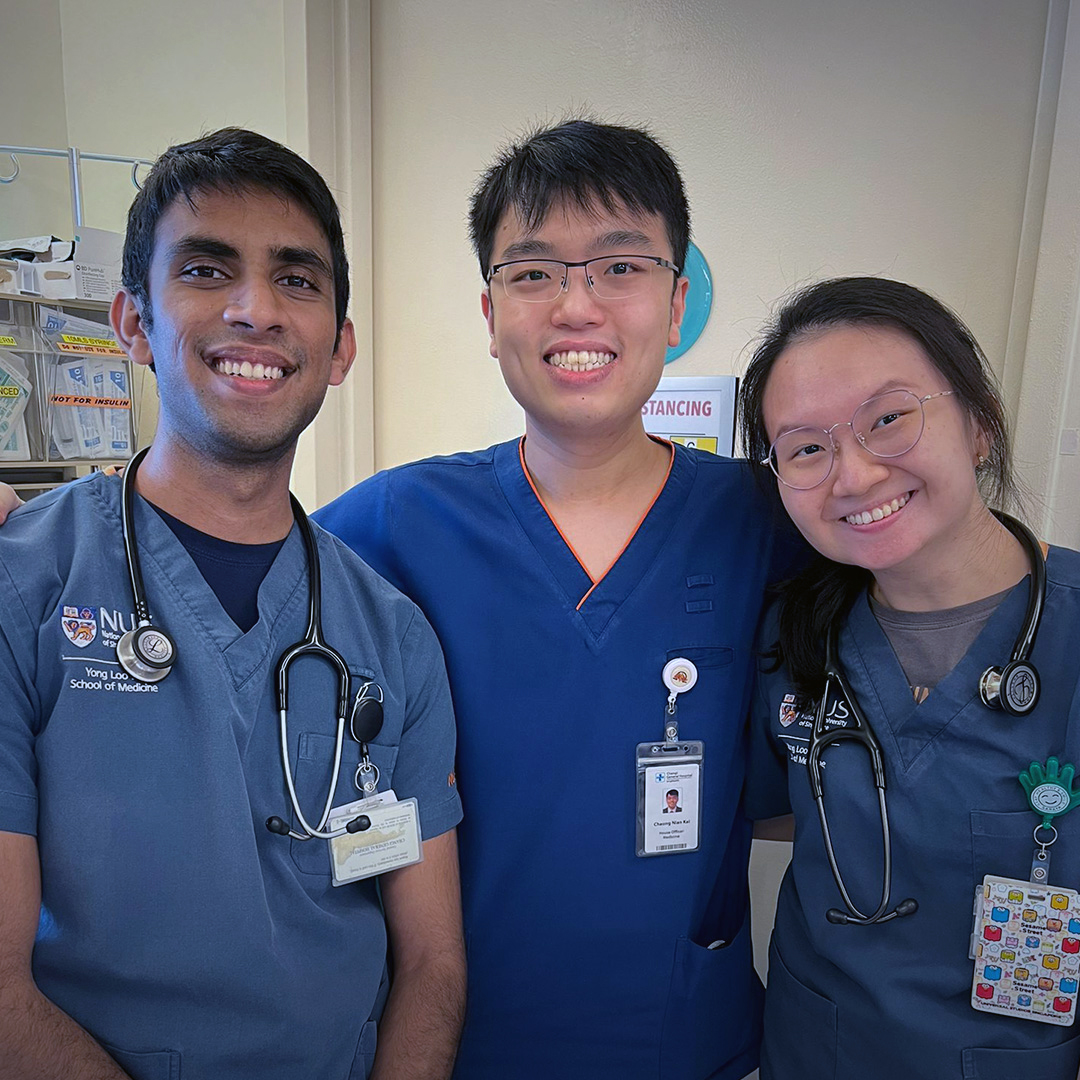 Nian Kai during his General Medicine posting with student interns at Changi General Hospital.
Nian Kai during his General Medicine posting with student interns at Changi General Hospital.
"I was always impressed by my general practitioners (GPs) when I was young. What stood out to me was how caring and friendly they were. They were always patient and willing to answer any questions their patients had," says Nian Kai.
Adding on, "That made me want to follow in their footsteps and become a doctor myself. My goal was and still is to provide my patients with the best treatment possible."
After applying to medical school for a few years, Nian Kai was accepted by the Nanyang Technological University (NTU) Lee Kong Chian School of Medicine, achieving his dreams of becoming a doctor. After he started school, he learnt about the PSC (Medicine) scholarship.
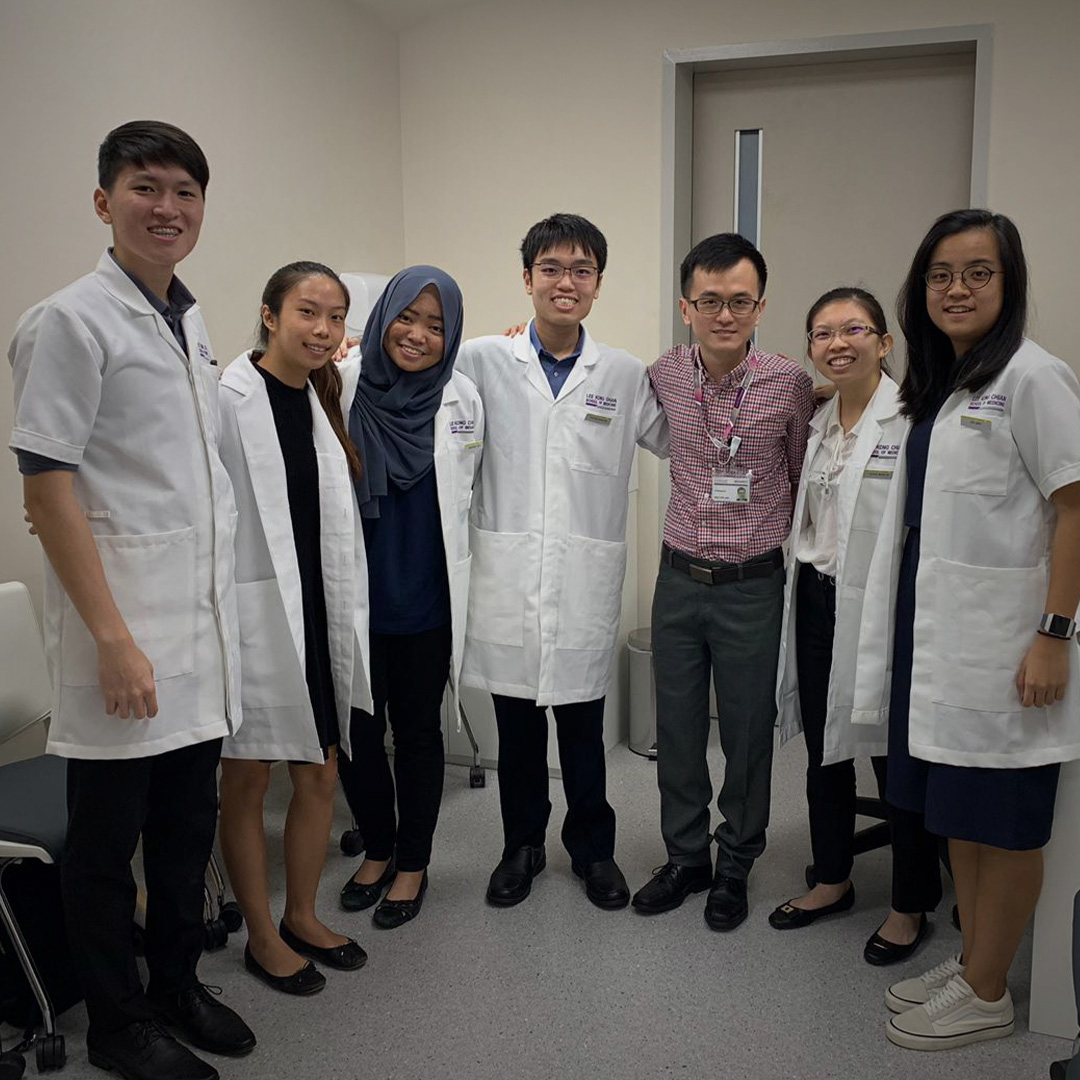 Nian Kai with his classmates at the Lee Kong Chian School of Medicine
Nian Kai with his classmates at the Lee Kong Chian School of Medicine
He submitted his application in his second and third year before finally being invited for an interview during his fourth year of medical school. After a stringent selection process consisting of various assessments and interviews, Nian Kai was awarded the scholarship.
A Learning Journey — Becoming a House Officer
Nian Kai served as a House Officer after graduating from NTU and was selected for the SingHealth Postgraduate Year 1 (PGY1) Programme. As any doctor can attest to, the journey of a House Officer is challenging, in terms of one's mental and physical health.
"Housemanship was a steep learning curve, with the stress and long hours being on-call, and managing emergencies in the hospital," Nian Kai says. His experience was an exceptionally challenging one as a House Officer amidst the COVID-19 pandemic. Nian Kai served as a House Officer in the COVID-19 wards during his General Medicine and Paediatric Medicine postings at the height of the pandemic, with high patient loads and long hours in PPE. But thanks to Nian Kai's cheery attitude and positive outlook on life, he could power through it all and keep going. He was later awarded the COVID-19 Resilience Medal for his efforts in the pandemic.
From Nian Kai's perspective, he believes that challenges are valuable learning opportunities and that making the best out of every situation is important.
After completing his Housemanship, he was posted to the Primary and Community Care Division at the Ministry of Health (MOH), where he was involved in the work behind Healthier SG, the Primary Care Networks and polyclinics. He later began his Family Medicine residency training with the National Healthcare Group (NHG).
“My time at MOH was valuable as I had the opportunity to do policy work and contribute to patient care at a systems level, and to look at community health through a different lens as I began my Family Medicine residency training. With the launch of Healthier SG, it is a privilege to be able to serve my patients and their families as part of this wider movement for population health", he added.
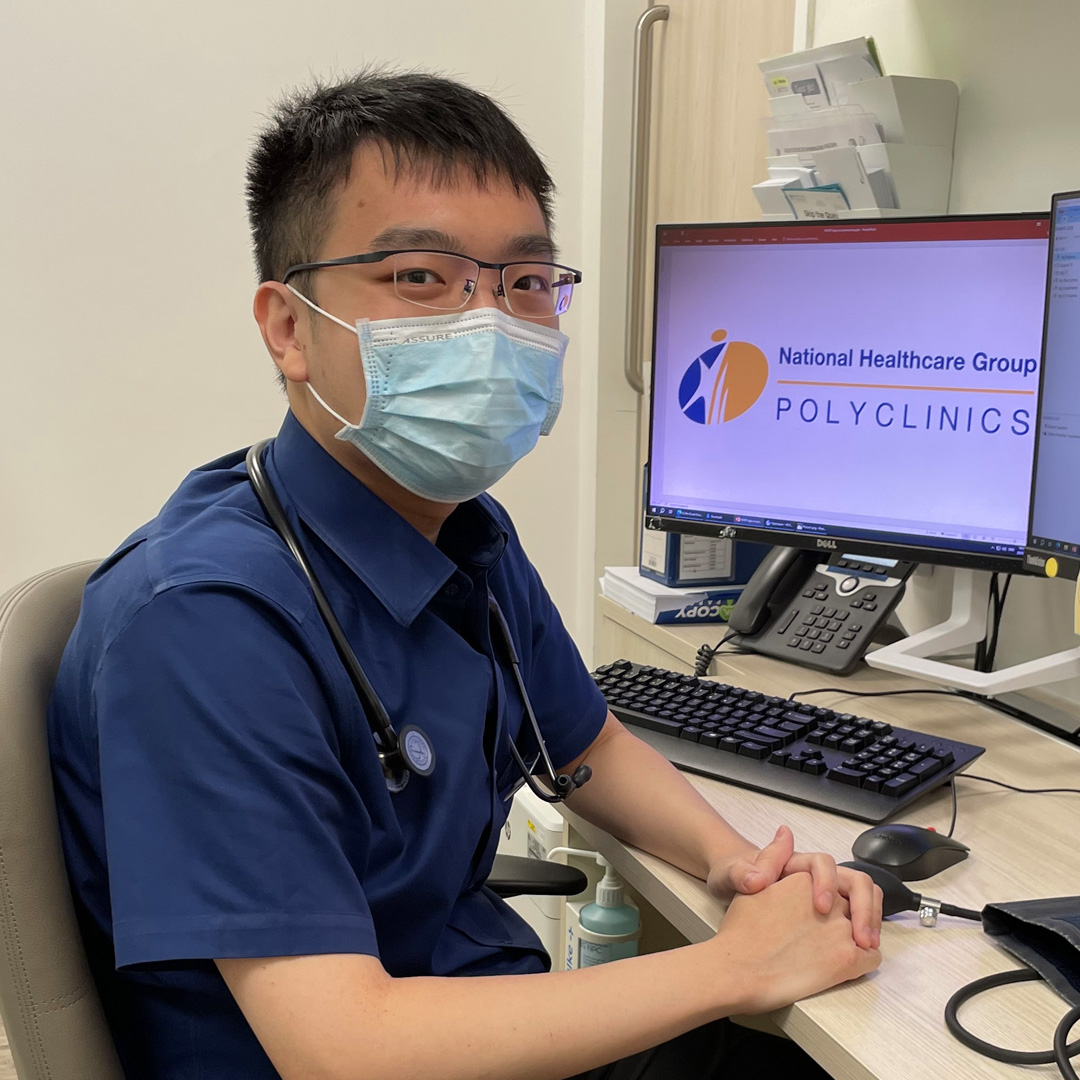 Nian Kai, about to start his day at Yishun Polyclinic
Nian Kai, about to start his day at Yishun Polyclinic
His experience in the wards and his time at NTU also helped Nian Kai realise the importance of proper preventive care for patients. It showed him the vital role that doctors play in guiding patients along their healthcare journey.
"By practising preventive care, we can avoid the downstream complications of disease and the need for hospital admissions. But for that to work, we (doctors) have to take a holistic approach, and work closely with patients and their families."
Nian Kai emphasises the importance of communication skills for doctors, especially those pursuing a speciality in Family Medicine. This was underscored in his interactions with the families of patients he had cared for, including a patient's worried parents when he was posted to the paediatric ward.
A toddler of three years old was brought to the hospital for a high fever and febrile seizures (convulsions brought on by the onset of high fever). The parents were understandably worried but later calmed down after listening to Nian Kai's explanation.
"Simple febrile seizures are quite common in children who have a high fever. The good news is that this is usually a benign condition and most children with this condition grow out of this when they are older. I always make sure to put extra effort into helping those under my care understand everything that's going on. I find that it helps to allay their fears and puts them in a calmer frame of mind," says Nian Kai.
Experiences like these bring fulfilment to Nian Kai as he is able to give patients the treatment they need and also help them understand their condition better, something he prioritises in every consult. It is also one of the main reasons why he chose to enter the profession in the first place, so that he can one day specialise in Family Medicine and provide quality care to patients and their families.
Eda Lim — Ensuring a Safe Take off and Landing for Patients
When asked why she chose medicine, Dr Eda Lim says, "Medicine allows me to challenge myself intellectually while giving me the freedom to not be stuck behind a desk."
"At the same time, it also keeps me grounded as my job is a constant reminder of human mortality," she adds.
This, coupled with Eda's strong sense of compassion and empathy, encouraged her to pursue a medical career where the unique blend of science and human interaction appealed to her.
Medical School and a Desire for Public Service
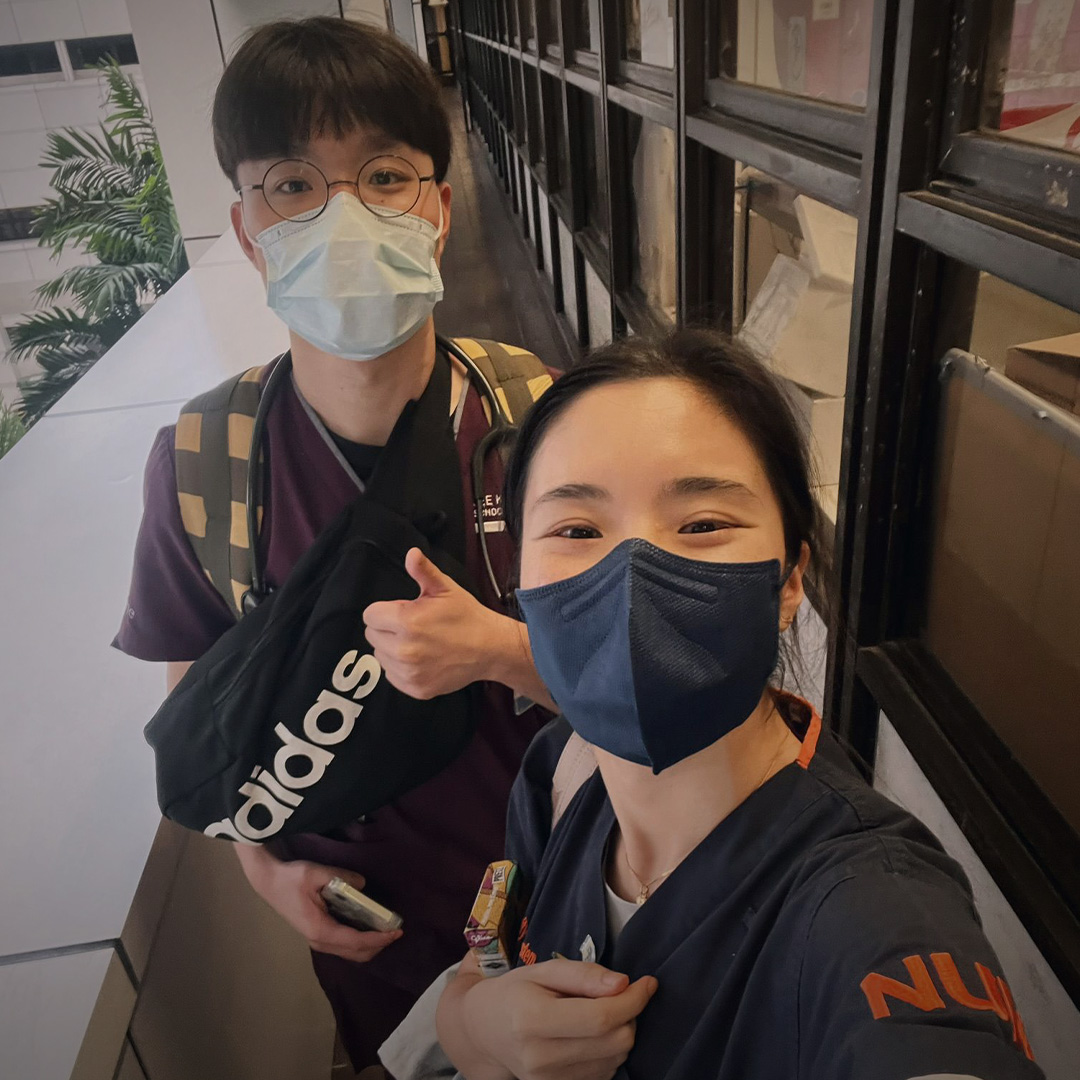 Eda and her brother, a final year medical student, were both posted to NUH
Eda and her brother, a final year medical student, were both posted to NUH
After enrolling at NUS Yong Loo Lin School of Medicine, National University of Singapore, Eda came to learn about the PSC Medicine scholarship.
"When I was in junior college at Raffles Institution, I got the opportunity to participate in a Governance and Civic Engagement Programme where I learnt about the impact of policies, human behaviour and psychology on societies today."
"Before that, I often visited my late grandfather in the hospital during his final days. There, I realised how overworked and busy the doctors and nurses were. While they tried their best to answer our questions, you could see that they were pretty overwhelmed."
This showed Eda that individual effort alone wouldn't be enough to change things for healthcare professionals on the ground. Instead, true positive change can only come from actual policies, and a PSC (Medicine) scholarship will allow her to do just that.
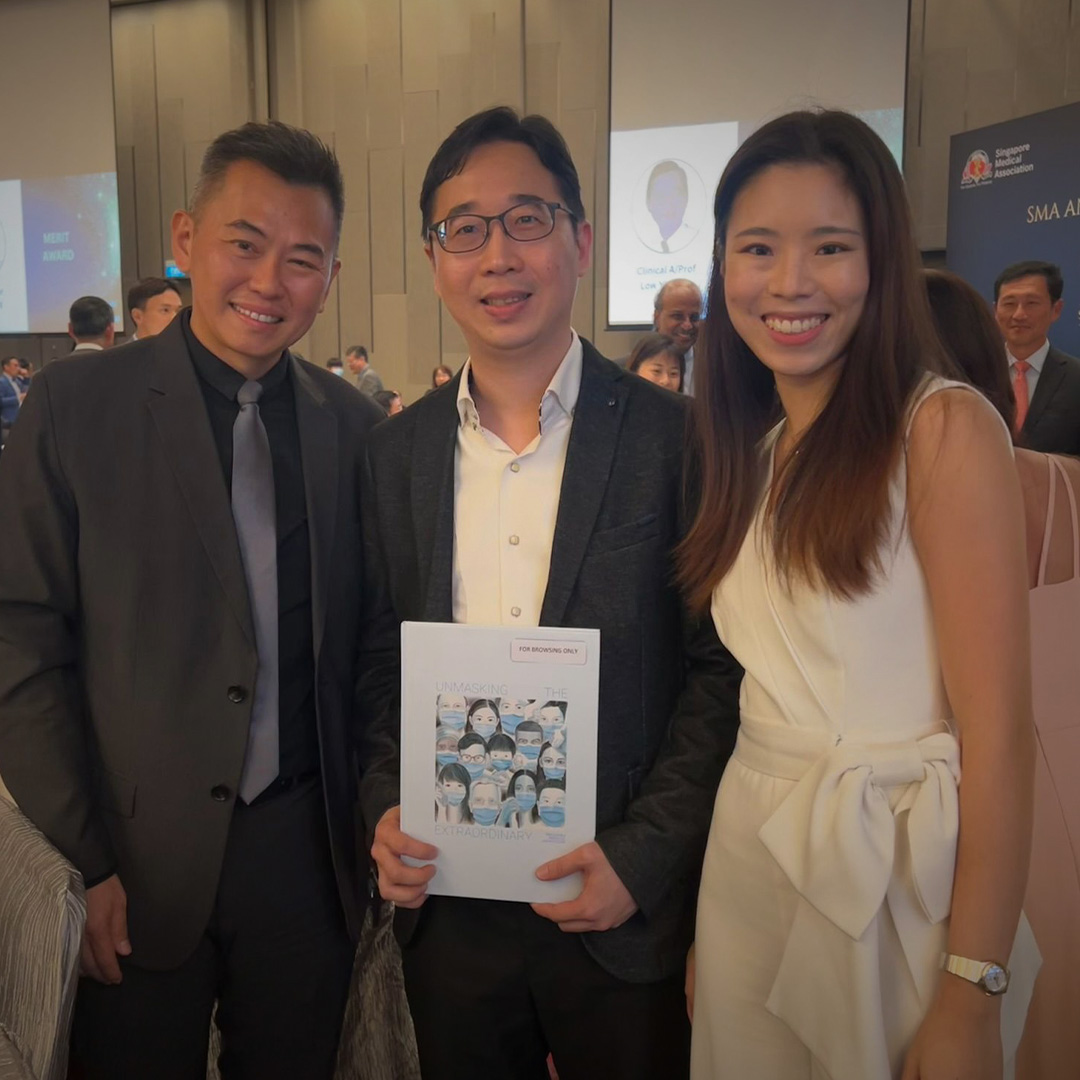 Eda with part of the MOH team she had worked with during COVID-19 when she was a first year Preventive Medicine Resident at the SMA dinner. Pictured are Deputy Director General of Health (HRG) A/Prof Raymond Chua (left) and Josef Lee (centre), the illustrator for a children's book MOH produced to help parents and children better understand the COVID-2019 protocols
Eda with part of the MOH team she had worked with during COVID-19 when she was a first year Preventive Medicine Resident at the SMA dinner. Pictured are Deputy Director General of Health (HRG) A/Prof Raymond Chua (left) and Josef Lee (centre), the illustrator for a children's book MOH produced to help parents and children better understand the COVID-2019 protocols
The PSC offers a variety of opportunities for candidates looking to pursue a career in the public service sector.
PSC scholars participate in a variety of development programmes that equip them with the critical knowledge, skills and experiences that enable them to better serve Singapore and Singaporeans.
The Human Side of Healthcare
Upon completion of her housemanship, Eda was accepted into the Preventive Medicine Residency. As part of the training programme in her first year, she was posted to one of MOH's policy team which dealt with and established protocols for the management of COVID-19 patients in Singapore.
"I was fortunate back then to have joined the team when there was a much better understanding of COVID-19 and its risks."
From Eda's perspective, the professionalism and resilience of the leadership team backing them was what kept everything on track. But beyond the professionalism, it was the shared humanity, the raw, compassionate moments, and the camaraderie amongst the staff truly highlighted the spirit of healthcare during the crisis.
She recalls, "One of the stalwarts who stood out was my immediate supervisor. He kept a professional front as he grappled with personal grief — his wife was battling cancer. He stayed strong and was always cheerful and willing to talk.
The way he balanced personal grief with professional responsibilities taught us that medicine, at its core, is about human connections. Sadly, his wife eventually succumbed to the disease, but throughout it all, he displayed immense strength."
Another memory close to Eda's heart is from her time in the Paediatric Oncology ward in early 2020.
"There was a boy who was receiving treatment for leukaemia and had to be admitted on numerous occasions to receive a chest drain insertion for a pleural effusion (water in his lungs)."
"This is an invasive procedure, and even adults would probably be afraid. But where other kids would cry or struggle, he (Eda's patient) was always cooperative and maintained a smile on his face."
He would also end up celebrating his last birthday at the hospital, where Eda and her team came together to buy him a cake and throw him a small party.
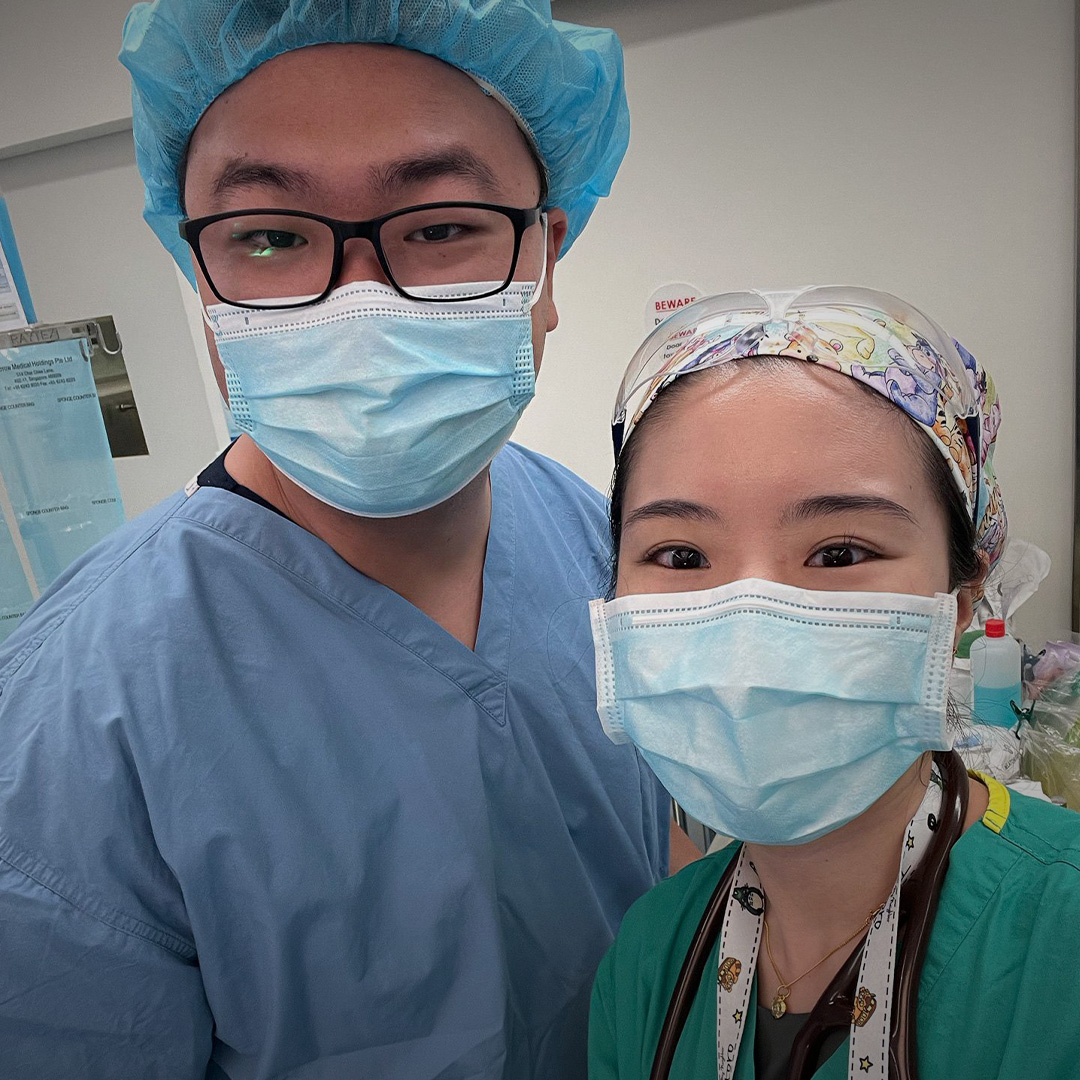 Eda with a Paediatric colleague, the doctor responsible for the newborn child, while Eda was part of the team providing anaesthesia for the mother.
Eda with a Paediatric colleague, the doctor responsible for the newborn child, while Eda was part of the team providing anaesthesia for the mother.
Several months later, when Eda had moved to another clinical posting, she received news from one of her seniors that the boy had passed on, which hit her hard.
"I remember crying between cases in the operating theatre (She had already moved on to another posting in anaesthesia as a Medical Officer) that day. It is already very heart-breaking seeing such an understanding young child, who was at an age where he was cognizant of his condition, go through so much, but this was made even more difficult when I found out this child didn't make it.
Such poignant moments remind Eda of the fragility of human life and the important role that doctors play in caring for their patients even as they make their final journey.
Anaesthesiology Residency and the Future
At the time of this article, Eda has taken up an anaesthesiology residency. Here, she can work in a hands-on environment and continue building up her clinical skills.
"When I started my Housemanship, I realised I enjoyed clinical work immensely. And by taking up an anaesthesiology residency, I can build up those skills and learn more about the healthcare sector."
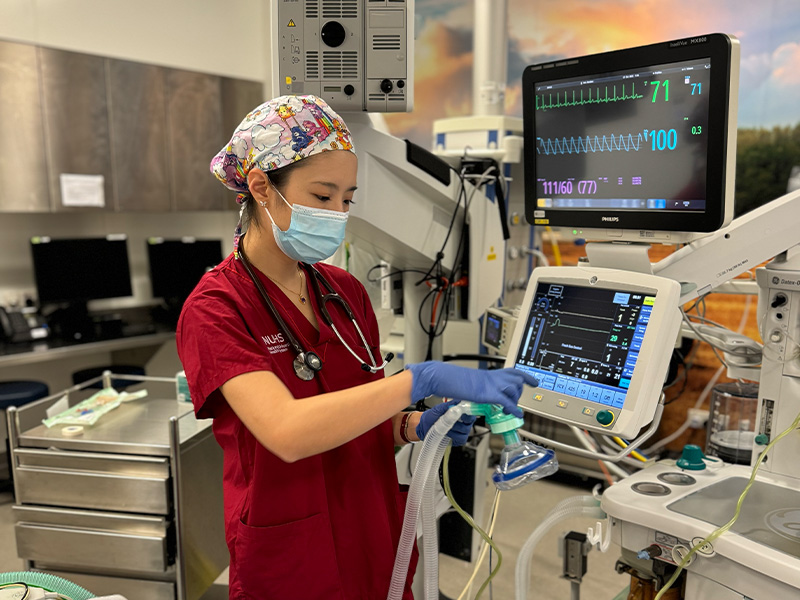 Eda preparing for surgery
Eda preparing for surgery
However, her role hasn't been without its fair share of challenges.
Looking back, she remembers the first time she had to handle a laryngospasm, which is a common clinical scenario when a patient is undergoing general anaesthesia, on her own in OT back in 2020.
"It was my first time having to handle a laryngospasm alone after I passed my baby MO test in OT, so I was really nervous. The patient was on a LMA (laryngeal mask airway which is a type of airway inserted to help patients under general anaesthesia with ventilation) and I noted that there were some turbulent airway noises associated with mildly increased airway pressures on the ventilator which suggested a laryngospasm."
In layman's terms, laryngospasm is like a sudden cramp of the vocal cords. This can happen when there is a greater level of intraoperative stimulation such as pain.
It is a primitive protective airway reflex but can result in the absence of a patent airway to ensure gas exchange transiently when a supraglottic airway (i.e. airway that sits above the glottis, otherwise known as vocal cords) is used.
Unfortunately, the patient was indeed having laryngospasm, and for a moment, Eda felt terrified.
Taking a deep breath, she calmed down and fell back on her training, and within a few moments, the patient had stabilised again.
Experiences like these drew Eda back into clinical work; as she puts it, "I enjoy working with my hands and making an impact in the lives of my patients."
In the long term, Eda intends to specialise in Anaesthesia, and upon completing her training, she hopes to branch out into healthcare policies and administration.
Looking to Pursue a Career in Medicine?
For those looking to walk in Nian Kai and Eda's footsteps they offer some advice.
"Perseverance and the will to continue onwards are essential for success. Don't get beaten down or discouraged by setbacks; instead, build up your resilience and tough it out," says Eda.
Nian Kai adds, "The tough times don't last forever; take all challenges as an opportunity to keep learning."
While MOH offers policy-related roles, you can pursue clinical roles in the specialist or non-specialist tracks in the various healthcare clusters and institutions based on your interests and strengths.
Want to find out more about the Family Medicine specialty? Click here for a TikTok by Dr Cheong Nian Kai.
Want to find out more about the Anaesthesiology specialty? Click here for a TikTok by Dr Eda Lim.
The PSC Medicine/Dentistry Scholarship is currently open for applications. The scholarship tenable at NUS Yong Loo Lin School of Medicine, Lee Kong Chian School of Medicine, Duke-NUS Medical School and NUS faculty of Dentistry. For more details, check out this page.